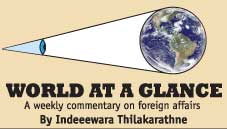|

NTC forces driven back from Bani Walid
Anti-Gaddafi forces have been forced to pull back from Bani Walid
after meeting fierce resistance from those loyal to the ousted Libyan
leader.
Fighters came under heavy shelling and gunfire after entering the
town, 90 miles (140 kilometres) south-east of the capital Tripoli.
Further to the east, forces are continuing an assault on Sirte,
another remaining Gaddafi stronghold.
Earlier, the UN voted to give Libya's seat to the transitional
authorities.
The move, which faced only minor opposition, clears the way for
National Transitional Council (NTC) chief Mustafa Abdul Jalil to attend
the UN General Assembly in New York next week.
US officials say President Barack Obama will meet Mr Jalil on the
sidelines of the gathering on Tuesday.
The UN has also passed a resolution to ease sanctions against Libya,
including on its national oil company and national bank.
British Foreign Secretary William Hague said about $19bn (£12bn) in
Libyan assets frozen in the UK would be gradually released as a result.
Shortly after entering Bani Walid, NTC forces were were hit by sniper
fire, mortar attacks and rocket barrages as they tried to advance on the
city centre.
Palestinians set date for UN bid
The Palestinians say they will ask for full membership at the UN next
week, though they are still prepared to consider a "credible"
alternative.
Unless such an offer comes, Palestinian leader Mahmoud Abbas will
submit the application on 23 September, spokesman Riad Malki said.
Israeli PM Benjamin Netanyahu said he would address the UN's annual
gathering on Israel's objections to the move. Senior US envoys are in
the region, trying to avert a Palestinian bid.
The last round of peace talks between Israel and the Palestinians
broke down a year ago.
Since then, the Palestinians have pursued a campaign to join the UN
as a full member state with international recognition, based on their
1967 borders and with East Jerusalem as a capital.
Crisis in Euro
The costs of efforts to save the euro are justified by the claim that
the alternative would be too dreadful to contemplate. But economic
history is littered with examples of fixed exchange rates that came
unfixed; the disuniting of currency unions, though rarer, happens from
time to time. So how do the costs of sustaining the euro compare with
the costs of its falling apart?
The question does not have a simple answer. For a start, there are
lots of different ways to fall apart: a wholesale dissolution into the
original currencies; a fissioning into northern hard-currency and
southern soft-currency blocks; or the exit of a trickle of countries, or
just one. Further complexities come from the panoply of choices the
departing and remaining states would make after the fall. And all this
turns as much or more on law and politics as on economics.
Take two specific scenarios. Germany could leave, either on its own
or with a select group of small economies-Austria, Finland and the
Netherlands-as recently suggested by Hans-Olaf Henkel, a former head of
the Federation of German Industries. Second, and more likely, Greece
might secede or be forced out.
In each instance, the economic consequences could be devastating,
argue many analysts. If Germany were to leave, its Neue Deutschmark
would soar as international funk money piled into a bigger, better
Switzerland, and German manufacturing firms would suffer. German banks
could cope with the switch of domestic deposits and loans into the new
currency, but they would have to be recapitalised because their foreign
assets in euros would now be worth less in domestic terms.
If Greece were to leave, its reborn drachma would plummet-which might
be good for its exporters but which would trigger what Barry
Eichengreen, a monetary historian at the University of California,
Berkeley, has called "the mother of all financial crises". The
devaluation of the drachma against the euro would turn any debts that
remained in euros into a crippling burden. At the same time depositors,
who are already edging towards the exit, would break into a headlong
rush, bringing down Greece's banking system.
A recent study by economists at UBS, a Swiss bank, suggested that the
costs in each of these eventualities would be forbiddingly high. If
Germany were to leave, it would incur costs worth 20-25% of GDP in the
first year and then roughly half that amount in each subsequent year. If
Greece were to quit, the first-year cost would be 40-50% of GDP, and
subsequent annual costs would be around 15%. |

